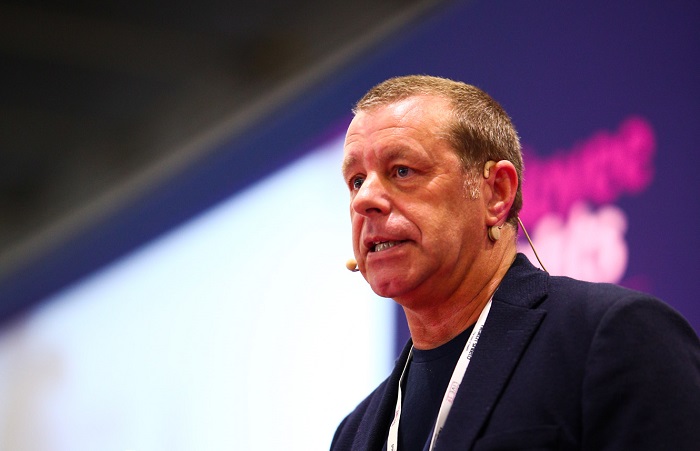
Employee Benefits Live 2019: Jonathan Collinge (pictured), corporate social responsibility (CSR) manager at multinational sports clothing brand Adidas, opened day two of Employee Benefits Live 2019 with insights into how the organisation approaches culture and the employee experience.
Collinge’s keynote speech, which took place on Wednesday 2 October 2019 at the ExCeL London and was titled ‘Boosting wellbeing and performance in a new era of HR’, discussed the business benefits of improving engagement, as well as providing practical insights into the particular approach taken by Adidas.
A key obstacle was the need to gain senior buy-in, particularly when faced with leaders with potentially vastly differing expectations and demands, ranging from the need to quantify profits to the desire to do the right thing and be seen as a caring employer.
“Sometimes we go blue in the face because we see it so clearly and we think ‘why can’t they see it?’; you need to take everybody on the same journey with you,” Collinge explained.
The first step in this journey is to identify an organisation’s culture model. For Adidas, this is naturally drawn from the context of the sports industry, while for others it might be vastly different, Collinge advised.
“Evaluate the current situation, where you are today,” he said. “Looking at how [you] do things, the way [you] operate, and thinking about how you bring everyone on the same journey is so important.”
Next, is the need to create a strong strategy for the future, and finally to identify what Collinge and Adidas have termed ‘own goals’, namely being honest about what has gone wrong in the past, and what needs to be avoided moving forward.
On the topic of creating HR and people strategies, Collinge stated that his approach is to review every 90 days and report back to leadership, rather than creating a plan once per year and failing to follow up. This maintains momentum and ensures accountability and continued relevance, he explained.
When it comes to ‘own goals’, Collinge outlined a number of ways in which Adidas has gone wrong in the past, which have been used as learning experiences to build for a better approach in the future. These were: failing to have a visible plan; not keeping up momentum; not including employees in shaping what should happen within the organisation; making assumptions and using a one-size-fits-all approach; not reviewing progress regularly; and failing to get leadership involvement.
Collinge said: “[Employers] need to continually look [themselves] in the mirror and think, ‘are we doing the right things? Are we listening to the business?’ And then start to look at how [they] create that strategy, taking on board the elements unique to [the organisation].”
Creating the right kind of culture could be as simple as considering the dress code, and whether the business necessitates traditional formal dress, or whether employees can in fact be trusted to dress how they feel best.
“Your business may not be like that, but we have to find the right balance so that we are able to be creative,” he said.
At Adidas, in addition to an informal dress code, flexibility is promoted as standard, and employees are trusted to work from home for 20% of their time. This flexibility also applies during the working day, as the organisation encourages staff to shift and flex their hours during the working day to go for a walk or a run, to boost wellbeing and, in turn, allow employees to perform at their best.
“We have a very open, transparent office,” he added. “Only the senior leadership team has an office, everything else is open plan and you can work wherever you want. So we have the culture now, where the word ‘trust’ comes in. By building the right performance culture, you gain that trust.”
For some teams, working flexibly and from home is not possible, and Adidas has had to think about how to ensure all employees are rewarded and motivated.
At this stage, he highlighted the importance of thanking and celebrating employees for their contribution and performance. At Adidas, this has meant finding out the rewards that employees particularly want, to ensure that it is clear that the organisation values staff contribution, rather than seeing it as a generic tick-box exercise.
This does not have to be complex or expensive, Collinge explained: “My team, every other Friday, gets cream cakes. They like cream cakes. It’s important to reward people, but find out what they really like, and it’s always a winner.”
Finally, a thriving culture and environment go hand in hand with communication, which should be simple, accessible and free of jargon. “Right from the beginning, make sure that people understand what it is we are all aiming for,” concluded Collinge.